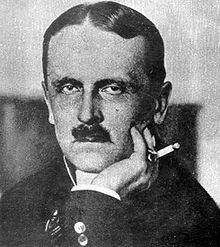Ulrich von Brockdorff-Rantzau
| Ulrich von Brockdorff-Rantzau | |
|---|---|
 |
|
| Foreign Minister of Germany | |
|
In office 13 February 1919 – 20 June 1919 |
|
| President | Friedrich Ebert |
| Chancellor | Philipp Scheidemann (Ministerpräsident) |
| Preceded by |
Wilhelm Solf (Imperial Germany) Council of the People's Deputies |
| Succeeded by | Hermann Müller |
| Personal details | |
| Born |
29 May 1869 Schleswig, Kingdom of Prussia |
| Died | 8 September 1928 (aged 59) Berlin, Free State of Prussia |
| Political party | none |
| Profession | Politician, diplomat |
Ulrich Karl Christian Graf von Brockdorff-Rantzau (29 May 1869 – 8 September 1928) was a German diplomat who became the first Foreign Minister of the Weimar Republic. In this capacity, he led the German delegation at the Paris Peace Conference but resigned over the signing of the Treaty of Versailles. He later was German Ambassador to the USSR from 1922 to 1928.
Ulrich von Brockdorff-Rantzau was born in Schleswig on 29 May 1869. He was the son of Graf Hermann zu Rantzau (1840-72), a Prussian civil servant (Regierungsassessor) of the Rantzau family and his wife Gräfin Juliane zu Rantzau, née von Brockdorff from Rastorf. Ulrich had a twin brother, Ernst Graf zu Rantzau (1869–1930) who later became a Geheimer Regierungsrat.
In 1891, a great-uncle left him the manor Annettenhöh near Schleswig, and he took the name "Brockdorff-Rantzau".
In 1888-91, he studied law at Neuchâtel, Freiburg im Breisgau, Berlin (Referendarsexamen in 1891) and Leipzig. He was awarded a Dr. jur. at Leipzig in 1891. Too young to join the Auswärtiges Amt (AA), the Imperial Foreign Office, he joined the Prussian Army as Fahnenjunker and was soon promoted to Leutnant in the 1. Garderegiment zu Fuß (stationed in Flensburg). After an injury he left military service in 1893 and became a diplomat in the Foreign Office: as an Attaché at the AA in 1894, 1894-96 at the German Gesandtschaft at Brussels, 1896-97 at the AA (trade policy department), 1897-1901 as Legationssekretär (secretary to the embassy) at St Petersburg, 1901-09 at Vienna, where he soon rose to Legationsrat and, after a short stay at Den Haag, in 1905 to Botschaftsrat. From 1909-12 he was political Generalkonsul at Budapest and in May 1912 became envoy to Copenhagen.
...
Wikipedia
